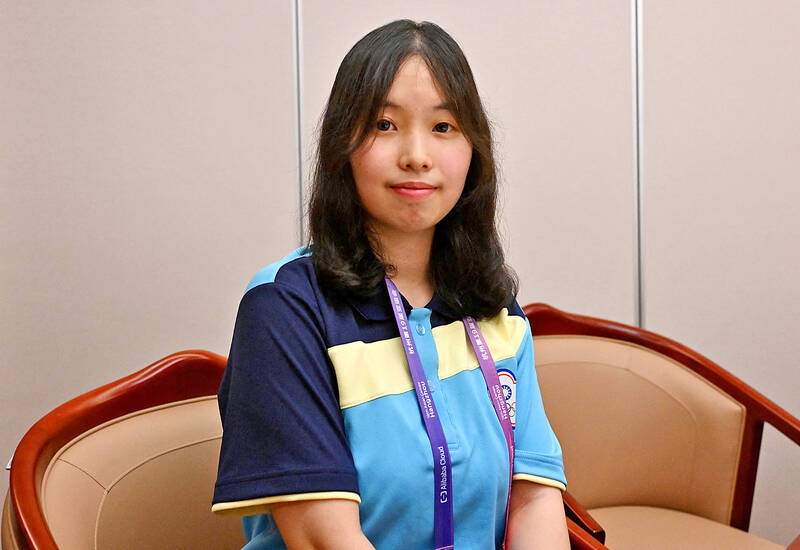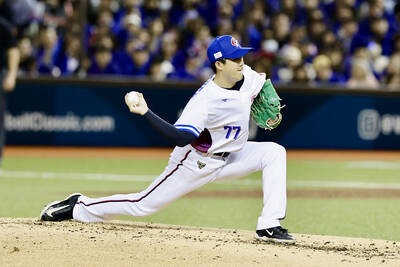With some players in their 70s and opponents young enough to be their grandchildren, age is just a number for bridge competitors engaged in a battle of wits at the Asian Games.
Masood Mazhar was born in the final months of World War II and before the partition of India and Pakistan, while Taiwan’s Chen Kuan-hsuan is just 23.
“My father used to play so I’ve been playing all my life,” said the 78-year-old Mazhar, competing for Pakistan.

Photo: AFP
People have enjoyed variations of bridge for centuries, but the tactical card game is a relatively new discipline at the Asian Games, only becoming a medal event in 2018.
Players sit in fours at square tables, working in pairs to win as many “tricks” as they can in each round.
After all these decades, the game never gets old for Mazhar, who said he began entering competitions in the mid-1980s.
“You learn every day. Every board, you learn, you never get the same thing again ever,” he said, referring to the hands of cards players get dealt each game. “Everything is new every time — it’s an adventure.”
Bridge is usually associated with older generations and the majority of players at the Games are older than 40.
Chen wants to change all that.
She played with her university’s bridge club and at youth tournaments before graduating into the World Team Championships and now the Asian Games.
“I seek self-fulfillment through bridge competitions,” she said.
She said that bridge players must “maintain good relations with your teammates and partner ... and use logic and inference to complete each move and each calculation” — a challenge she loves.
“I hope that by competing I can draw the attention of more young people, not just the ones who already play bridge,” she said.
Mazhar said the problem is that young people simply do not have time to get into bridge these days.
“If you really want to play good bridge, you have to give a lot of time, and that means you have to practice at least three to four hours a day,” he said.

Taiwan kept its hopes of advancing to the 2026 World Baseball Classic (WBC) alive with a 9-1 victory over South Africa in a qualifier at the Taipei Dome last night, backed by solid pitching. Bouncing back from Friday’s struggles on the mound, when Taiwanese pitchers surrendered 15 runs to Spain, Team Taiwan kept the visiting team in check, allowing just one run in the bottom of the fourth inning. The win was crucial for Taiwan, as a loss would have eliminated the team from contention for the next WBC. Starting pitcher Sha Tzu-chen (沙子宸) struck out one and allowed no hits, except for

The Chinese Professional Baseball League (CPBL) is considering reducing its pitch clock by two seconds to help players better adjust to the rules applied at the World Baseball Classic (WBC). The proposal aims to shorten the pitch timer from 25 seconds to 23 seconds with the bases empty, and from 20 seconds to 18 seconds with runners on base. Currently, the WBC mandates that pitchers deliver a pitch every 18 seconds with the bases empty and 15 seconds with runners on base. The issue was raised during a pre-season CPBL managers’ meeting on Tuesday by Rakuten Monkeys bench and batting

Taiwan kept their hopes of advancing to next year’s World Baseball Classic (WBC) alive with a 9-1 victory over South Africa in a qualifier at the Taipei Dome on Saturday, backed by solid pitching. Taiwan last night played against Nicaragua. As of press time, Nicaragua was leading 6-0. Bouncing back from Friday’s struggles on the mound, when Taiwanese pitchers surrendered 15 runs to Spain, Team Taiwan on Saturday kept the visiting team in check, allowing just one run in the bottom of the fourth inning. Starting pitcher Sha Tzu-chen struck out one and allowed no hits, except for a hit-by-pitch over

‘SETTING THE TONE’: Donovan Mitchell said that their determination to dominate had nothing to do with past results, but was about a potential post-season clash The Cleveland Cavaliers on Friday boosted their NBA-best record with a 142-105 romp past the New York Knicks, tightening their grip on the Eastern Conference lead with an all-around dominant display. Donovan Mitchell scored 27 points to lead six Cavs players to score in double figures, connecting on five of seven three-pointers as Cleveland drilled 19 from beyond the arc. “I think the biggest thing was just try to set the tone early,” Mitchell said, adding that the determination to dominate had nothing to do with the Knicks’ first-round playoff win over the Cavs two seasons ago and everything to do with